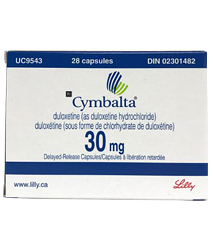Cymbalta (Duloxetine) prescribed for?
Cymbalta (Duloxetine) is a tricyclic antidepressant used to treat depression and anxiety. It is also helpful in relieving nerve pain in people with diabetes or ongoing pain caused by medical conditions like arthritis. It can improve your mood, sleep, appetite, and energy level, while reducing nervousness. Additionally, it can help decrease pain caused by certain medical conditions. This medication is known as a serotonin-norepinephrine reuptake inhibitor (SNRI). It works by restoring the balance of certain natural substances (serotonin and norepinephrine) in the brain.Cymbalta (Duloxetine) Information
How to use Cymbalta (Duloxetine)
Take this medication as your doctor told you to. Usually, it's 1 or 2 times a day, with or without food. If it makes you feel nauseous, taking it with food may help.
Swallow the capsule whole. Don't crush, chew, or mix it with food or liquid. This could cause too much of the drug to be released at once and increase the risk of side effects.
The dose you need depends on your age, medical condition, and how you respond to the treatment. To lower the risk of side effects, your doctor may start you on a low dose and gradually increase it. Follow your doctor's instructions carefully. Take the medication regularly at the same time each day to get the most benefit.
Keep taking the medication even if you start feeling better. Don't stop it without talking to your doctor first. Suddenly stopping the medication might worsen some conditions and cause symptoms like dizziness, confusion, mood swings and headache. If your doctor decides to stop the medication, they will likely reduce the dose gradually to avoid withdrawal symptoms.
Before you start using this medication and every time you get a refill, read the Medication Guide provided by your pharmacist. If you have any questions, ask your doctor or pharmacist.
If your condition doesn't improve or gets worse, tell your doctor about it.
Cymbalta (Duloxetine) drug interactions
The list provided below includes drugs that are recognized to interact with Duloxetine. However, it is important to note that this is not an exhaustive compilation of all potential drug interactions.
- Baclofen
- Levothyroxine
- Prednisone
- Gabapentin
- Topamax (Topiramate)
- Metformin
- Trazodone
- Ambien (Zolpidem)
- Lisinopril
- Ibuprofen
- Klonopin (Clonazepam)
- Tramadol
- Singulair (Montelukast)
- Flexeril (Cyclobenzaprine)
- Lamictal (Lamotrigine)
- Lyrica (Pregabalin)
- Adderall (Amphetamine / Dextroamphetamine)
- Atorvastatin
- Oxycodone
- Hydrochlorothiazide
- Aspirin
- Xanax (Alprazolam)
- Synthroid (Levothyroxine)
- Clonazepam
- Omeprazole
- Tizanidine
- Nexium (Esomeprazole)
- Seroquel (Quetiapine)
Disclose all of your current medications, including prescription medications and OTC products, to your doctor. They will assess the potential interaction and determine whether it is beneficial to use both drugs together. If not, adjustments need to be made to your treatment plan.
Common Side effects of Cymbalta (Duloxetine)?
Few known side effects of Duloxetine capsules. Please note that this is not a complete list of all possible side effects.
- nausea
- headache
- increased sweating
- dizziness
- reduced appetite
- fatigue (lack of energy)
- constipation
- trouble sleeping
- belly pain
- sexual side effects in females and males
- dry mouth
- sleepiness
- weight loss
Please inform your doctor about any side effects you experience. If you find these side effects difficult to manage, contact your doctor for medical advice.
Recommended dosage of Cymbalta (Duloxetine)?
The recommended dosage of Cymbalta (Duloxetine) for adults is 60 mg once a day. Some patients may start at 30 mg once a day for one week. It may be increased to 60 mg once a day. For children, the dose should be determined by a doctor.
Cymbalta (Duloxetine) FAQs
Cymbalta cost in Canada?
Cymbalta 30mg Capsules cost in Canada
- 28 capsules - $112.35 USD ($4.01 per capsule)
- 56 capsules - $215.24 USD ($3.84 per capsule)
- 84 capsules - $297.15 USD ($3.54 per capsule)
Can Cymbalta be used for pain management?
Yes, Cymbalta can be used for pain management. It is an antidepressant medication that also works to alleviate various types of chronic pain. It functions by affecting certain neurotransmitters in the brain and spinal cord that are involved in pain perception. Consult a doctor before using Cymbalta for pain management to determine if it's the right option for your specific condition.
Is Cymbalta an antidepressant?
Yes, Cymbalta is an antidepressant medication.
How long does it take for Cymbalta to start working?
Cymbalta typically takes around 1 to 4 weeks to start showing noticeable effects in improving mood and relief of depression symptoms. However, the exact time frame can vary from person to person. It's important to follow your doctor's instructions and give the medication enough time to take effect before making any adjustments.
Can I drink alcohol while taking Cymbalta?
It's generally not recommended to drink alcohol while taking Cymbalta. Mixing alcohol with prescription drugs can increase the risk of side effects and affect how the medication works. It's best to talk to your doctor before drinking alcohol during treatment.
Can Cymbalta cause sexual side effects?
Yes, Cymbalta can potentially cause sexual side effects. These include changes in libido, difficulty achieving or maintaining an erection and reaching orgasm. If you experience any of these issues while taking Cymbalta, it's important to discuss them with your doctor. They can help you manage any side effects or consider alternative treatment options.
Can Cymbalta cause weight gain?
Yes, Cymbalta can potentially cause weight gain as a side effect in some individuals. It's a good idea to discuss side effects with your healthcare provider before starting the medication. They can provide personalised guidance and monitor your progress while you're on medication.
